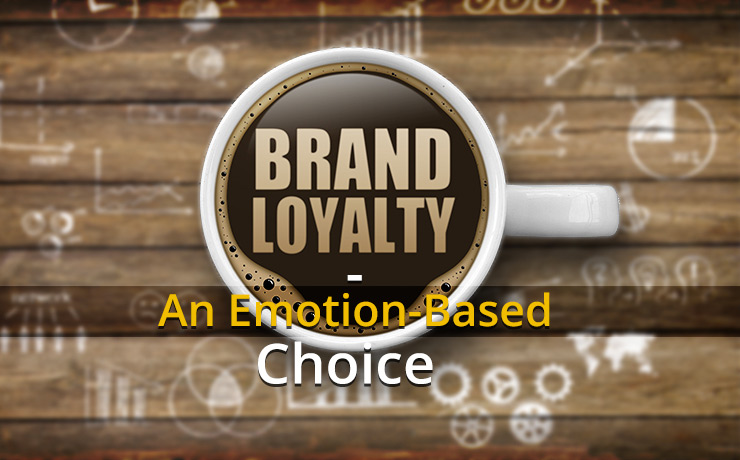
I sat at my desk thinking how I should start this post. A nice, witty, fun but meaningful introduction is always a good idea, yet… blank. Sure, I have access to a plethora of statistics, metrics and guidelines, however, I am not loyal to my favorite department store because their logo is cool!
Then I tried to look at myself as a consumer and to ask myself why I pick certain brands. I realized that I actually don’t care about brands per se. What I care about is how a certain brand makes me feel. This led to me becoming curious about what others think. I started asking people in my life the very same question “Why do you go back to that particular store, restaurant, why do you always buy the same brand of sneakers? Every single answer started with “I feel”.
The next step was, of course, the internet. Studies show that brand loyalty is an emotion-based decision: people often travel farther or pay more money to go to a certain restaurant, because it makes them feel at home. We often buy a dessert because it “tastes like childhood” and some of us are willing to pay a big chunk of our income on that really pricey bag because it feels good! It is, then, safe to assume, that emotion plays a major part in a buyer’s decision making.
So then I decided to see what exactly are these emotions that make us like a brand more than another.
Of course, safety is the first thing we consider when picking a brand. We all want to feel secure. Be it with our finances or our haircut, we want to feel safe when making a decision. And let’s not forget, you’ll never eat again at that restaurant that while it didn’t give you food poisoning, didn’t really make you feel safe. We don’t want to spend our money on a product or service that we don’t fully trust, and that is understandable.
However, there must be more than just wanting to feel safe when choosing a brand. Surfing the internet, and looking at some successful emotional branding efforts, it seems there are four emotions that keep us coming back for more of a certain product or service:
Belonging to a Community
From the small business owner who services the people in town to the big corporate mammoth that somehow still finds the time to give back to their community, all businesses depend on people. And these people need to feel connected to the company they are buying from.
People want to help their own community, it is likely they will hire or purchase from someone they can relate to, someone they know. Furthermore, people often chose brands like Rapha or Nike because they feel that they belong to a community when they work out. Amazon was quick to understand the value of a community, as a result of that they acquired Goodreads, as a tool to gain a better understanding of the types of books people like to read – this has proved very profitable for the Kindle side of the brand. Much like Rapha, Harley Davidson also has its own community, the brand owns its own biker club where members can celebrate their passion for the all-time classic motorcycle.
There’s No Place like Home… a Sense of Family
There is nothing more important for us than our families. Needless to say, brands that seem to understand that seem to be more successful in their marketing efforts. Family-owned businesses are trusted; they speak of humble beginnings and hard work. It is easy to see how people tend to warm up to these companies, and why shouldn’t they? We already have something in common – a family.
Companies like Walmart, Ford, IKEA have that one thing in common, they started as a family-owned business. Branding is much more than a pretty logo and a catchy tagline, before anything else, branding is a story. From the tale of the young siblings that decided to conquer the world, to the one of the grown ups that devoted their lives to providing for their families while delivering a high quality product to your family, these businesses inspire us to dream big and above all inspire us to trust them. Their families are in good hands with them, it is likely that yours is too.
Being in Good Hands
Of course, customer service plays a huge role in how consumers see our business. In today’s economy, poor customer service is the fastest way to kill your business. But in our highly competitive market, how do you go above and beyond for your customers and how do you monetize on that? Word of mouth.
More and more companies make efforts in displaying their positive reviews from clients. Often, before choosing where to have dinner, we stop first on Yelp to see what others say about a certain restaurant. Some companies go even farther in their efforts to keep their clients happy, and this is always a successful strategy!
Luka Apps, a 7 year old boy that lost his favorite LEGO figurine wrote a letter to LEGO, telling the tale. LEGO wrote back to Luka, sending him another figurine. A small price to pay for showing the world how much your company cares for their consumers. Most likely, Luka will be sure to buy LEGOs for his children, when time comes. But even more so, the exchange went viral on the internet, and LEGO gained lots and lots of golden stars!
The Ritz Carlton is known for shipping lost items to their guests, free of charge. That shows that every single guest is cared for and remembered. On a smaller scale, Netflix and Spotify make sure to answer every single message, be it on Social Media or in their customer service chats, and solving every single issue effectively and efficiently. These are all small gestures that build trust and make consumers feel cared for.
Feeling like a King
Luxury feels good. It makes us feel like we reached a certain milestone in life and it speaks of our success. Do people need 12-bedroom mansions and cars that cost as much as a small village? Definitely not! Do we WANT them? Definitely YES! Not quite ready for that mansion? How about a watch? Or shoes? Earrings? There are quite a number of brands for each of those items, that will make you feel like royalty!
But is it just the price that attracts us or is there more to it? For most of these brands, just by looking at the logo we already know what it stands for, we already want that product.
A good example is Louis Vuitton. While the designs of their products change based on each line one thing stays consistent, and that is the LV monogram which works as a reminder of the brand’s heritage – exceptionally high quality luggage, started in a small shop in Paris in 1854. When you are buying a Louis, you are buying the history, the tradition. Similarly, brands like Gucci, Chanel and Dior sell a lifestyle and not a product. These are brands that speak of exceptional quality, high-end experiences and exclusive clubs. What’s not to like?
So, as we have seen above, our money goes where our heart is. It is exceptionally important to keep that in mind, when starting a business and building your brand. How do you think your clients feel about your brand? Not quite sure yet? Give us a call and ask for Irina!
 Free
Consultation
Free
Consultation Free
Google Ads Audit
Free
Google Ads Audit








